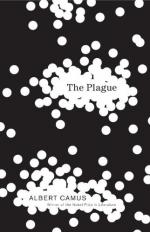|
|
The Plague Part 2 (Section 4)
The hot weather is baking the already miserable townspeople, and the summer that used to be for sunbathing and holidays is now given to the plague. There is a bit of lawlessness simmering, and the police are now patrolling the streets and guarding the gates with revolvers.
Tarrou's diary notes that the radio is announcing the number of deaths per day now, rather than per week, and the cat man has gone from hope to sadness after trying to call the cats with no reply for a week. Of Paneloux's sermon, Tarrou writes:
"I can understand this sort of fervor and find it not displeasing. At the beginning of a pestilence and when it ends, there's always a propensity for rhetoric. In the first case, habits have not yet been lost; in the second, they're returning. It is in the thick of a calamity that one gets hardened to the truth--in other words, to silence." Part 2, pg. 116
Tarrou explains the meaning of the two pots that the old asthma patient is always moving peas back and forth between. Instead of using a watch, the old man--who wants to do nothing with his days--moves the peas back and forth to keep track of time. Tarrou is curious about the man, and wonders if his behavior is that of a saint.
Though shops are running out of goods and restaurants are low on food, the cafes fill to capacity at lunchtime. People spend their money like it's going out of style, and are generally living recklessly; knowing that they may die at any moment, they've turned away from God and to more immediate sorts of satisfaction.
Tarrou comes to visit Rieux, volunteering his help with the plague epidemic--he has drawn up a plan for voluntary helpers, and wants it enacted without having to go through the official channels, which he thinks are inadequate against the plague. As he's discussing this plan with Rieux, the two get into a discussion about morals in the time of plague, particularly about what role God might have in a world with this sort of suffering. When Tarrou asks the doctor whether he believes in God, Rieux says he does not. The doctor further clarifies his personal philosophy when Tarrou asks him to compare himself with Paneloux:
"Paneloux is a man of learning, a scholar. He hasn't come in contact with death; that's why he can speak with such assurance of the truth--with a capital T. But every country priest who visits his parishioners and has heard a man gasping for breath on his deathbed thinks as I do. He'd try to relieve human suffering before trying to point out its goodness." Part 2, pg. 126
Tarrou's explanation of his own moral beliefs is mysterious. When the doctor asks him if he really believes he knows everything about life, Tarrou says yes, he does. What he's after, he says, is "comprehension."
Tarrou's good intentions are put into use via his development of sanitary squads, groups of volunteers that bring the townspeople together with a common cause for all. It's not just the doctors and the officials now fighting the plague:
"Many fledgling moralists in those days were going about our town proclaiming there was nothing to be done about it and we should bow to the inevitable. And Tarrou, Rieux, and their friends might give one answer or another, but its conclusion was always the same, their certitude that a fight must be put up, in this way or that, and there must be no bowing down... There was nothing admirable about this attitude; it was merely logical." Part 2, pg. 133
Grand's part as a volunteer is to keep the books as a general secretary to the sanitary squads, a job he takes on without any protest. Dr. Rieux and Tarrou, who are seeing more of Grand, begin to take an interest in the manuscript he's working on. His struggle with his book reveals itself to be a painstaking obsession with that one sentence. Every word has such potential to create an image, which may be the wrong image or one that is not vivid enough in the reader's mind, that the struggle to find the perfect words might go on forever. Indeed, Rieux thinks that human language is failing to express sentiments about the plague as well. Of the comments of encouragement outsiders send on to Oran, the narrator says:
"... invariably their epical or prize-speech verbiage jarred on the doctor. Needless to say, he knew the sympathy was genuine enough. But it could be expressed only in the conventional language with which men try to express what unites them with mankind in general; a vocabulary quite unsuited, for example, to Grand's small daily effort..." Part 2, pg. 138




